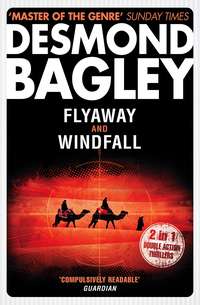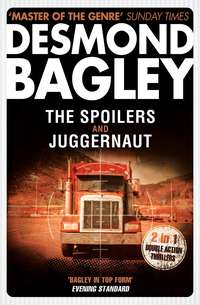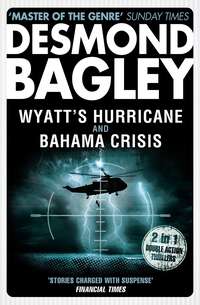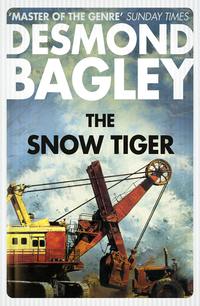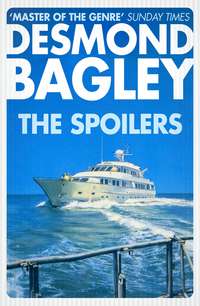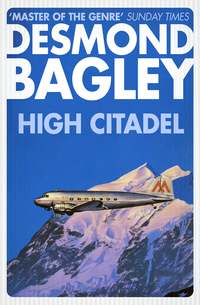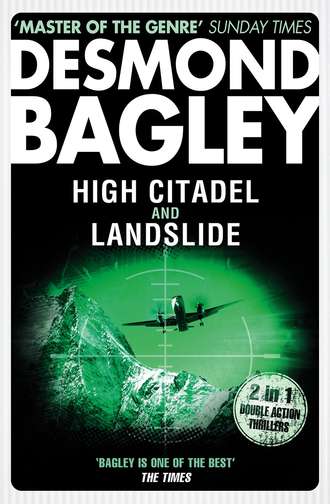
Полная версия
High Citadel / Landslide
Visibly she pulled herself together and her chin rose in determination. ‘All right,’ she said. ‘I’ll do my best.’
‘Good! You’d better come and have a look at the bridge to get your range right – and maybe you’d better take a few practice shots at the same range.’
He took her up to where Rohde was lying. ‘Miss Ponsky’s going to have a go with the crossbow,’ he said.
Rohde looked at it with interest. ‘Does it work?’
‘It’s got the range and velocity,’ O’Hara told him. ‘It should work all right.’ He turned his attention to the bridge. Two men had just put in another plank and were retreating. The gap in the bridge was getting very small – soon it would be narrow enough for a determined man to leap. ‘You’d better take the nearest man the next time they come out,’ he said. ‘What would you say the range is?’
Miss Ponsky considered. ‘A little less than the range I’ve been practising at,’ she said. ‘I don’t think I need to practise any more.’ There was a tremor in her voice.
O’Hara regarded her. ‘This has got to be done, Miss Ponsky. Remember what they did to Mrs Coughlin – and what they’ll do to us if they get across the bridge.’
‘I’ll be all right,’ she said in a low voice.
O’Hara nodded in satisfaction. ‘You take Rohde’s place. I’ll be a little way along. Take your time – you needn’t hurry. Regard it as the target practice you’ve just been doing.’
Forester had already cocked the bow and handed it up to Miss Ponsky. She put a bolt in the trough and slid forward on her stomach until she got a good view of the bridge. O’Hara waited until she was settled, then moved a little way farther along the edge of the gorge. He looked back and saw Forester talking to Armstrong, who was lying full-length on the ground, his eyes closed.
He found a good observation post and lay waiting. Presently the same two men appeared again, carrying a plank. They crawled the length of the bridge, pushing the plank before them until they reached the gap – even though none of them had been hit, they weren’t taking unnecessary chances. Once at the gap they got busy, lashing the plank to the two main ropes.
O’Hara found his heart thumping and the wait seemed intolerably long. The nearest man was wearing a leather jacket similar to his own and O’Hara could see quite clearly the flicker of his eyes as he gazed apprehensively at the opposite bank from time to time. O’Hara clenched his fist. ‘Now!’ he whispered. ‘For God’s sake – now!’
He did not hear the twang as the crossbow fired, but he saw the spurt of dust from the man’s jacket as the bolt hit him, and suddenly a shaft of steel sprouted from the man’s back just between the shoulder blades. There was a faint cry above the roar of the river and the man jerked his legs convulsively. He thrust his arms forward, almost in an imploring gesture, then he toppled sideways and rolled off the edge of the bridge, to fall in a spinning tangle of arms and legs into the raging river.
The other man paused uncertainly, then ran back across the bridge to the other side of the gorge. The bridge swayed under his pounding feet and as he ran he looked back fearfully. He joined the group at the end of the bridge and O’Hara saw him indicate his own back and another man shaking his head in disbelief.
Gently he withdrew and ran back to the place from which Miss Ponsky had fired the shot. She was lying on the ground, her body racked with sobs, and Forester was bending over her. ‘It’s all right, Miss Ponsky,’ he was saying. ‘It had to be done.’
‘But I’ve killed a man,’ she wailed. ‘I’ve taken a life.’
Forester got her to her feet and led her away, talking softly to her all the time. O’Hara bent and picked up the crossbow. ‘What a secret weapon!’ he said in admiration. ‘No noise, no flash – just zing.’ He laughed. ‘They still don’t know what happened – not for certain. Armstrong, you’re a bloody genius.’
But Armstrong was asleep.
IV
The enemy made no further attempts to repair the bridge that morning. Instead, they kept up a steady, if slow, light barrage of rifle fire, probing the tumble of rocks at the edge of the gorge in the hope of making hits. O’Hara withdrew everyone to safety, including Rohde. Then he borrowed a small mirror from Benedetta and contrived a makeshift periscope, being careful to keep the glass in the shadow of a rock so that it would not reflect direct sunlight. He fixed it so that an observer could lie on his back in perfect cover, but could still keep an eye on the bridge. Forester took first watch.
O’Hara said, ‘If they come on the bridge again use the gun – just one shot. We’ve got them off-balance now and a bit nervous. They don’t know if that chap fell off the bridge by accident, whether he was shot and they didn’t hear the report, or whether it was something else. We know it was something else and so does the other man who was on the bridge, but I don’t think they believe him. There was a hell of an argument going on the last I saw of it. At any rate, I think they’ll be leery of coming out now, and a shot ought to put them off.’
Forester checked the pistol and looked glumly at the four remaining bullets. ‘I feel a hell of a soldier – firing off twenty-five per cent of the available ammunition at one bang.’
‘It’s best this way,’ said O’Hara. ‘They don’t know the state of our ammunition, the crossbow is our secret weapon, and by God we must make the best use of it. I have ideas about that, but I want to wait for the second crossbow.’ He paused. ‘Have you any idea how many of the bastards are across there?’
‘I tried a rough count,’ said Forester. ‘I made it twenty-three. The leader seems to be a big guy with a Castro beard. He’s wearing some kind of uniform – jungle-green pants and a bush-jacket.’ He rubbed his chin and said thoughtfully, ‘It’s my guess that he’s a Cuban specialist.’
‘I’ll look out for him,’ said O’Hara. ‘Maybe if we can nail him the rest will pack up.’
‘Maybe,’ said Forester non-committally.
O’Hara trudged back to the camp which had now been transferred to the rock shelter on the hillside. That was a better defensive position and could not be so easily rushed, the attackers having to move over broken ground. But O’Hara had no great faith in it; if the enemy crossed the bridge they could move up the road fast, outflanking the rock shelter to move in behind and surround them. He had cudgelled his brain to find a way of blocking the road but had not come up with anything.
But there it was – a better place than the camp by the pond and the roadside. The trouble was water, but the rock hollow at the rear of the shelter had been filled with twenty-five gallons of water, transported laboriously a canful at a time, much of it spilling on the way. And it was a good place to sleep, too.
Miss Ponsky had recovered from her hysteria but not from her remorse. She was unaccustomedly quiet and withdrawn, speaking to no one. She had helped to transport the water and the food but had done so mechanically, as if she did not care. Aguillar was grave. ‘It is not right that this should be,’ he said. ‘It is not right that a lady like Miss Ponsky should have to do these things.’
O’Hara felt exasperated. ‘Dammit, we didn’t start this fight,’ he said. ‘The Coughlins are dead, and Benedetta was nearly killed – not to mention me. I’ll try not to let it happen again, but she is the best shot and we are fighting for our lives.’
‘You are a soldier,’ said Aguillar. ‘Almost I seem to hear you say, with Napoleon, that one cannot make an omelette without breaking eggs.’ His voice was gently sardonic.
O’Hara disregarded that. ‘We must all practise with the bow – we must learn to use it while we have time.’
Aguillar tapped him on the arm. ‘Señor O’Hara, perhaps if I gave myself to these people they would be satisfied.’
O’Hara stared at him. ‘You know they wouldn’t; they can’t let us go – knowing what we know.’
Aguillar nodded. ‘I know that; I was wondering if you did.’ He shrugged half-humorously. ‘I wanted you to convince me there is nothing to gain by it – and you have. I am sorry to have brought this upon all these innocent people.’
O’Hara made an impatient noise and Aguillar continued, ‘There comes a time when the soldier takes affairs out of the hands of the politician – all ways seem to lead to violence. So I must cease to be a politician and become a soldier. I will learn how to shoot this bow well, señor.’
‘I wouldn’t do too much, Señor Aguillar,’ said O’Hara. ‘You must conserve your strength in case we must move suddenly and quickly. You’re not in good physical shape, you know.’
Aguillar’s voice was sharp. ‘Señor, I will do what I must.’
O’Hara said no more, guessing he had touched on Spanish-American pride. He went to talk to Miss Ponsky.
She was kneeling in front of the pressure stove, apparently intent on watching a can of water boil, but her eyes were unfocused and staring far beyond. He knew what she was looking at – the steel bolt that had sprouted like a monstrous growth in the middle of a man’s back.
He said, ‘Killing another human being is a terrible thing, Miss Ponsky. I know – I’ve done it, and I was sickened for days afterwards. The first time I shot down an enemy fighter in Korea I followed him down – it was a dangerous thing to do, but I was young and inexperienced then. The Mig went down in flames, and his ejector seat didn’t work, so he opened the canopy manually and jumped out against the slipstream.
‘It was brave or desperate of that man to do that. But he had the Chinese sort of courage – or maybe the Russian courage, for all I know. You see, I didn’t know the nationality or even the colour of the man I had killed. He fell to earth, a spinning black speck. His parachute didn’t open. I knew he was a dead man.’
O’Hara moistened his lips. ‘I felt bad about that, Miss Ponsky; it sickened me. But then I thought that the same man had been trying to kill me – he nearly succeeded, too. He had pumped my plane full of holes before I got him and I crash-landed on the airstrip. I was lucky to get away with it – I spent three weeks in hospital. I finally worked it out that it was a case of him or me, and I was the lucky one. I don’t know if he would have had regrets if he had killed me – I think probably not. Those people aren’t trained to have much respect for life.’
He regarded her closely. ‘These people across the river are the same that I fought in Korea, no matter that their skins are a different colour. We have no fight with them if they will let us go in peace – but they won’t do that, Miss Ponsky. So it’s back to basics; kill or be killed and the devil take the loser. You did all right, Miss Ponsky; what you did may have saved all our lives and maybe the lives of a lot of people in this country. Who knows?’
As he lapsed into silence she turned to him and said in a husky, broken voice, ‘I’m a silly old woman, Mr O’Hara. For years I’ve been talking big, like everyone else in America, about fighting the communists; but I didn’t have to do it myself, and when it comes to doing it yourself it’s a different matter. Oh, we women cheered our American boys when they went to fight – there’s no one more bloodthirsty than one who doesn’t have to do the fighting. But when you do your own killing, it’s a dreadful thing, Mr O’Hara.’
‘I know,’ he said. ‘The only thing that makes it bearable is that if you don’t kill, then you are killed. It reduces to a simple choice in the end.’
‘I realize that now, Mr O’Hara,’ she said. ‘I’ll be all right now.’
‘My name is Tim,’ he said. ‘The English are pretty stuffy about getting on to first-name terms, but not we Irish.’
She gave him a tremulous smile. ‘I’m Jennifer.’
‘All right, Jenny,’ said O’Hara. ‘I’ll try not to put you in a spot like that again.’
She turned her head away and said in a muffled voice, ‘I think I’m going to cry.’ Hastily she scrambled to her feet and ran out of the shelter.
Benedetta said from behind O’Hara, ‘That was well done, Tim.’
He turned and looked at her stonily. ‘Was it? It was something that had to be done.’ He got up and stretched his legs. ‘Let’s practise with that crossbow.’
V
For the rest of the day they practised, learning to allow for wind and the effect of a change of range. Miss Ponsky tightened still further her wire-drawn nerves and became instructress, and the general level of performance improved enormously.
O’Hara went down to the gorge and, by triangulation, carefully measured the distance to the enemy vehicles and was satisfied that he had the range measured to a foot. Then he went back and measured the same distance on the ground and told everyone to practise with the bow at that range. It was one hundred and eight yards.
He said to Benedetta, ‘I’m making you my chief-of-staff – that’s a sort of glorified secretary that a general has. Have you got pencil and paper?’
She smiled and nodded, whereupon he reeled off a dozen things that had to be done. ‘You pass on that stuff to the right people in case I forget – I’ve got a hell of a lot of things on my mind right now and I might slip up on something important when the action starts.’
He set Aguillar to tying bunches of rags around half a dozen bolts, then shot them at the target to see if the rags made any difference to the accuracy of the flight. There was no appreciable difference, so he soaked one of them in paraffin and lit it before firing, but the flame was extinguished before it reached the target.
He swore and experimented further, letting the paraffin burn fiercely before he pulled the trigger. At the expense of a scorched face he finally landed three fiercely burning bolts squarely in the target and observed happily that they continued to burn.
‘We’ll have to do this in the day-time,’ he said. ‘It’ll be bloody dangerous in the dark – they’d spot the flame before we shot.’ He looked up at the sun. ‘Tomorrow,’ he said. ‘We’ve got to drag this thing out as long as we can.’
It was late afternoon before the enemy ventured on to the bridge again and they scattered at a shot from Rohde who, after a long sleep, had taken over again from Forester. Rohde fired another shot before sunset and then stopped on instructions from O’Hara. ‘Keep the last two bullets,’ he said. ‘We’ll need them.’
So the enemy put in three more planks and stepped up their illumination that night, although they dared not move on the bridge.
FOUR
Forester awoke at dawn. He felt refreshed after having had a night’s unbroken sleep. O’Hara had insisted that he and Rohde should not stand night watches but should get as much sleep as they could. This was the day that he and Rohde were to go up to the hutted camp to get acclimatized and the next day to go on up to the mine.
He looked up at the white mountains and felt a sudden chill in his bones. He had lied to O’Hara when he said he had mountaineered in the Rockies – the highest he had climbed was to the top of the Empire State Building in an elevator. The high peaks were blindingly bright as the sun touched them and he wrinkled his eyes to see the pass that Rohde had pointed out. Rohde had said he would be sorry and Forester judged he was right; Rohde was a tough cookie and not given to exaggeration.
After cleaning up he went down to the bridge. Armstrong was on watch, lying on his back beneath the mirror. He was busy sketching on a scrap of paper with a pencil stub, glancing up at the mirror every few minutes. He waved as he saw Forester crawling up and said, ‘All quiet. They’ve just switched off the lights.’
Forester looked at the piece of paper. Armstrong had drawn what looked like a chemist’s balance. ‘What’s that?’ he asked. ‘The scales of justice?’
Armstrong looked startled and then pleased. ‘Why, sir, you have identified it correctly,’ he said.
Forester did not press it further. He thought Armstrong was a nut – clever, but still a nut. That crossbow of his had turned out to be some weapon – but it took a nut to think it up. He smiled at Armstrong and crawled away to where he could get a good look at the bridge.
His mouth tightened when he saw how narrow the gap was. Maybe he wouldn’t have to climb the pass after all; maybe he’d have to fight and die right where he was. He judged that by the afternoon the gap would be narrow enough for a man to jump and that O’Hara had better prepare himself for a shock. But O’Hara had seemed untroubled and talked of a plan, and Forester hoped to God that he knew what he was doing.
When he got back to the rock shelter he found that Willis had come down from the hutted camp. He had hauled a travois the whole way and it was now being unpacked. He had brought more food, some blankets and another crossbow which he was demonstrating to O’Hara.
‘This will be faster loading,’ he said. ‘I found some small gears, so I built them into the windlass – they make the cranking a lot easier. How did the other bow work?’
‘Bloody good,’ said O’Hara. ‘It killed a man.’
Willis paled a little and the unshaven bristles stood out against his white skin. Forester smiled grimly. The backroom boys always felt squeamish when they heard the results of their tinkering.
O’Hara turned to Forester. ‘As soon as they start work on the bridge we’ll give them a surprise,’ he said. ‘It’s time we put a bloody crimp in their style. We’ll have breakfast and then go down to the bridge – you’d better stick around and see the fun; you can leave immediately afterwards.’
He swung around. ‘Jenny, don’t bother about helping with the breakfast. You’re our star turn. Take a crossbow and have a few practice shots at the same range as yesterday.’ As she paled, he smiled and said gently, ‘We’ll be going down to the bridge and you’ll be firing at a stationary, inanimate target.’
Forester said to Willis, ‘Where’s Peabody?’
‘Back at the camp – making more arrows.’
‘Have any trouble with him?’
Willis grinned briefly. ‘He’s a lazy swine but a couple of kicks up the butt soon cured that,’ he said, unexpectedly coarsely. ‘Where’s Armstrong?’
‘On watch down by the bridge.’
Willis rubbed his chin with a rasping noise. ‘That man’s got ideas,’ he said. ‘He’s a whole Manhattan Project by himself. I want to talk to him.’
He headed down the hill and Forester turned to Rohde, who had been talking to Aguillar and Benedetta in Spanish. ‘What do we take with us?’
‘Nothing from here,’ Rohde said. ‘We can get what we want at the camp; but we must take little from there – we travel light.’
O’Hara looked up from the can of stew he was opening. ‘You’d better take warm clothing – you can have my leather jacket,’ he offered.
‘Thanks,’ Forester said.
O’Hara grinned. ‘And you’d better take your boss’s vicuna coat – he may need it. I hear it gets cold in New York.’
Forester smiled and took the can of hot stew. ‘I doubt if he’ll appreciate it,’ he said drily.
They had just finished breakfast when Willis came running back. ‘They’ve started work on the bridge,’ he shouted. ‘Armstrong wants to know if he should shoot.’
‘Hell no,’ said O’Hara. ‘We’ve only got two bullets.’ He swung on Rohde. ‘Go down there, get the gun from Armstrong and find yourself a good spot for shooting – but don’t shoot until I tell you.’
Rohde plunged down the hill and O’Hara turned to the others. ‘Everyone gather round,’ he ordered. ‘Where’s Jenny?’
‘I’m here,’ called Miss Ponsky from inside the shelter.
‘Come to the front, Jenny; you’ll play a big part in all this.’ O’Hara squatted down and drew two parallel lines in the dust with a sharp stone. ‘That’s the gorge and this is the bridge. Here is the road; it crosses the bridge, turns sharply on the other side and runs on the edge of the gorge, parallel to the river.’
He placed a small stone on his rough diagram. ‘Just by the bridge there’s a jeep, and behind it another jeep. Both are turned so that their lights illuminate the bridge. Behind the second jeep there’s a big truck half full of timber.’ O’Hara placed a larger stone. ‘Behind the truck there’s another jeep. There are some other vehicles farther down, but we’re not concerned with those now.’
He shifted his position. ‘Now for our side of the gorge. Miguel will be here, upstream of the bridge. He’ll take one shot at the men on the bridge. He won’t hit anyone – he hasn’t yet, anyway – but that doesn’t matter. It’ll scare them and divert their attention, which is what I want.
‘Jenny will be here, downstream of the bridge and immediately opposite the truck. The range is one hundred and eight yards, and we know the crossbow will do it because Jenny was shooting consistently well at that range all yesterday afternoon. As soon as she hears the shot she lets fly at the petrol tank of the truck.’
He looked up at Forester. ‘You’ll be right behind Jenny. As soon as she has fired she’ll hand you the bow and tell you if she’s hit the tank. If she hasn’t, you crank the bow, reload it and hand it back to her for another shot. If she has hit it, then you crank it, run up to where Benedetta will be waiting and give it to her cocked but unloaded.’
He placed another small stone. ‘I’ll be there with Benedetta right behind me. She’ll have the other crossbow ready cocked and with a fire-bolt in it.’ He looked up at her. ‘When I give you the signal you’ll light the paraffin rags on the bolt and hand the crossbow to me, and I’ll take a crack at the truck. We might need a bit of rapid fire at this point, so crank up the bows. You stick to seeing that the bolts are properly ignited before the bows are handed to me, just like we did yesterday in practice.’
He stood up and stretched. ‘Is that clear to everyone?’
Willis said, ‘What do I do?’
‘Anyone not directly concerned with this operation will keep his head down and stay out of the way.’ O’Hara paused. ‘But stand by in case anything goes wrong with the bows.’
‘I’ve got some spare bowstrings,’ said Willis. ‘I’ll have a look at that first bow to see if it’s okay.’
‘Do that,’ said O’Hara. ‘Any more questions?’
There were no questions. Miss Ponsky held up her chin in a grimly determined manner; Benedetta turned immediately to collect the fire-bolts which were her care; Forester merely said, ‘Okay with me.’
As they were going down the hill, though, he said to O’Hara, ‘It’s a good plan, but your part is goddam risky. They’ll see those fire-bolts before you shoot. You stand a good chance of being knocked off.’
‘You can’t fight a war without risk,’ said O’Hara. ‘And that’s what this is, you know; it’s as much a war as any bigger conflict.’
‘Yeah,’ said Forester thoughtfully. He glanced at O’Hara sideways. ‘What about me doing this fire-bolt bit?’
O’Hara laughed. ‘You’re going with Rohde – you picked it, you do it. You said I was garrison commander, so while you’re here you’ll bloody well obey orders.’
Forester laughed too. ‘It was worth a try,’ he said.
Close to the gorge they met Armstrong. ‘What’s going on?’ he asked plaintively.
‘Willis will tell you all about it,’ said O’Hara. ‘Where’s Rohde?’
Armstrong pointed. ‘Over there.’
O’Hara said to Forester, ‘See that Jenny has a good seat for the performance,’ and went to find Rohde.
As always, Rohde had picked a good spot. O’Hara wormed his way next to him and asked, ‘How much longer do you think they’ll be fixing that plank?’
‘About five minutes.’ Rohde lifted the pistol, obviously itching to take a shot.
‘Hold it,’ O’Hara said sharply. ‘When they come with the next plank give them five minutes and then take a crack. We’ve got a surprise cooking for them.’


